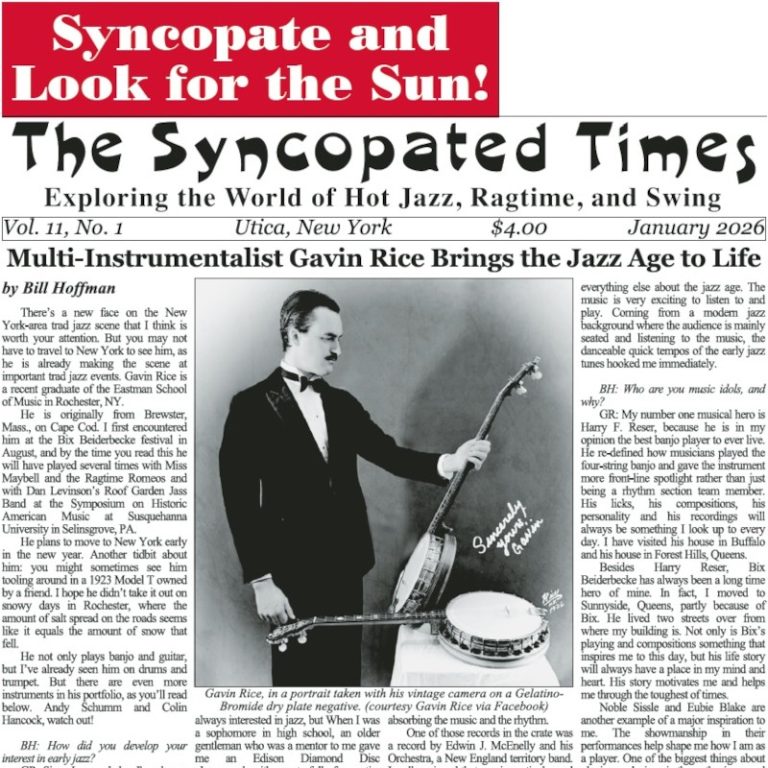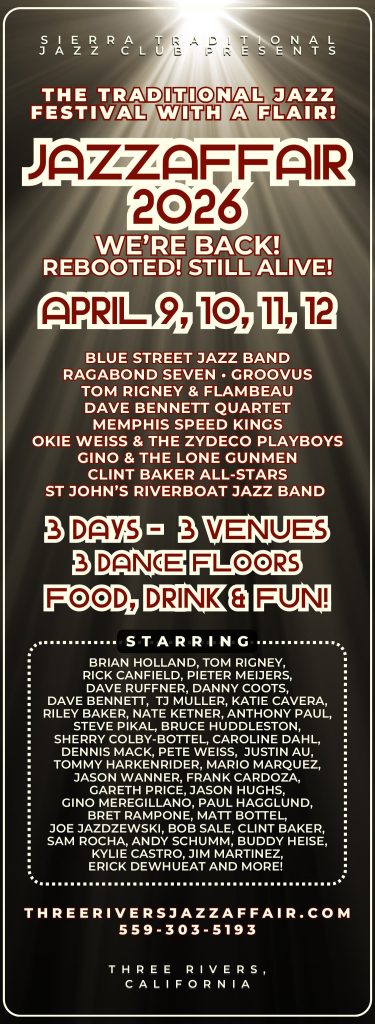 Tex Wyndham is a recognized authority on ragtime and early jazz. He has played them on over 30 recordings and, since l968, at many national festivals, community concerts, and ragtime/jazz clubs, plus approximately 30 cruises, as cornetist/leader of The Rent Party Revellers, The MTB (Margery Thompson Birthday) Jazz Band and The Red Lion Jazz Band, as a band pianist, and as a ragtime soloist.
Tex Wyndham is a recognized authority on ragtime and early jazz. He has played them on over 30 recordings and, since l968, at many national festivals, community concerts, and ragtime/jazz clubs, plus approximately 30 cruises, as cornetist/leader of The Rent Party Revellers, The MTB (Margery Thompson Birthday) Jazz Band and The Red Lion Jazz Band, as a band pianist, and as a ragtime soloist.
Tex has performed throughout the U.S.A., including Alaska and Hawaii, and in Canada, London, the Mediterranean, the Caribbean, and the Mexican Riviera.
For many years starting in 1966, Tex authored, columns and reviewed ragtime and classic jazz recordings for several publications including The American Rag, The Mississippi Rag, Coda, The Second Line, and Rag Times. During 1966-1997, he wrote published reviews of more recordings of ragtime, Dixieland jazz and related music than any other U.S.-based writer.
Tex is the only jazz writer to place among the top three in the “Favorite Jazz Critic” category of both (1985 and 1996) of the Jazzology Records Polls. He also placed among the top three in the “Jazz Journalist” category, and ranked fourth in the “Favorite Ragtime Pianist” category, of The Mississippi Rag Trad Jazz & Ragtime Poll (reported 1999).
Tex is the author of the book Texas Shout: How Dixieland Jazz Works. He wrote the introduction, and acted as consultant, for Hal Leonard Publishing’s music folio The Definitive Dixieland Collection. Reproductions from Tex’s extensive sheet music collection have appeared in a number of folios and scholarly musical books, on a CD cover, and on a Sundance Channel show. The sheet music to two of his ragtime compositions has been published by Ragtime Press.
In 1974, Toronto’s Ragtime Society presented Tex with an award “in grateful recognition of his contribution to ragtime.” In l992, he was the first recipient of the Pennsylvania Jazz Society’s musician’s Jazzer Award “for his contribution to the preservation, promotion, and presentation of traditional or mainstream jazz music.” Also in 1992, Tex acted as the Sacramento Jazz Jubilee’s Festival Jazz Education Coordinator and, in addition, was the luncheon speaker and a panel discussion leader at the annual convention of the American Federation of Jazz Societies. In 1998, Tex was nominated for a National Heritage Fellowship in the Folk and Traditional Arts. In 2014, The Scott Joplin International Ragtime Foundation presented Tex with its lifetime achievement award.
Tex’s recordings of the three Dixieland/ragtime appreciation shows he wrote for presentation at festivals and cruises have been broadcast on jazz radio programs throughout the English-speaking world. Titled “The Sources Of Dixieland Jazz,” “A Guide To Dixieland Jazz,” and “A History Of Ragtime,” they have been used in musical courses from elementary school to college. Tex’s week-long seminar, titled “The World Of Ragtime, Early Tin Pan Alley and Dixieland Jazz,” has been presented at several Road Scholar/Elderhostel programs.
Tex has always been a Dixieland Jazz and ragtime musician at heart, but one who was born fifty years too late. That being the case, he attended Swarthmore College, graduating with a B.A. in mathematics in 1958 when he was ranked #3 scholastically among the men in his class. Swarthmore was followed by Harvard Law School (J.D. ’61, magna cum laude) and Harvard Business School (M.B.A. ’63, with high distinction). Then Tex returned to his home town, Wilmington, Delaware, and employment with the DuPont Company.
During his 29-year career in DuPont’s finance function, most of it in middle-management or middle-management-level positions, Tex managed sections that were responsible for, among other things: preparing and filing DuPont’s reports to the SEC; DuPont’s insurance program; and selecting investments for DuPont’s pension trust fund. He spent his last seven years as a middle-management level specialist in negotiating the financial aspects of business combinations (acquisitions, divestitures and mergers).
During his time with DuPont, Tex began using the vacations to perform at national ragtime and Dixieland jazz festivals and cruises. Since retiring from DuPont in 1992, he has devoted himself exclusively to musical employment.
The current audience for Dixieland jazz and ragtime is made up principally of rather elderly people and has, accordingly, been sharply diminishing in recent years. For this reason, although Tex remains available for performances, he is, as a practical matter, a semi-retired musician. Most of Tex’s traveling these days is not as a performer, but to attend vintage movie weekends with his wife Nancy.




